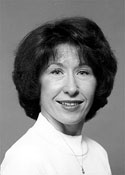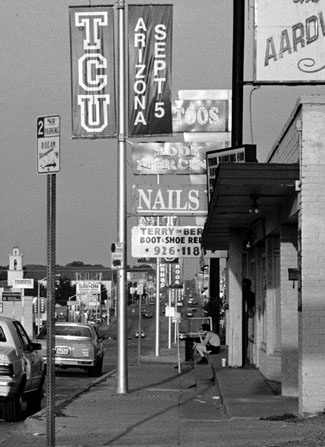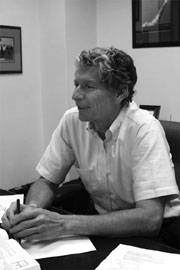By Lori Eshelman staff reporter Increasing TCU's academic prominence among private universities in America was the theme of Chancellor Michael R. Ferrari's state of the university address at Thursday's annual Fall Convocation. "(This is) a year to be marked by rising academic aspirations for what our university can become," Ferrari said to a full audience of faculty, staff, students and community members seated in Ed Landreth Auditorium. Ferrari said the general perception of TCU's academic reputation is not as high as it should be, given the strengths of the faculty and academic programs. He said he expects the year-long study by the Commission on the Future of TCU to examine TCU's capacity for greater academic distinction. Ferrari also said he will continue to address a number of needs and priorities - such as diversity, technology and global education - that were presented in last year's speech. In addition to Ferrari's state of the university address, two awards were presented to faculty and staff members. The inaugural Wassenich Award for Mentoring in the TCU Community was awarded to Darron Turner, director of minority affairs and commuter students. Ferrari said Turner received the $3,000 award for his clear and constant commitment to students. "I have the best job in the world - I get to work with students," Turner said. "(Receiving the award) is such an honor because there are so many people who do so many things for the students at TCU."
"I'm so honored, considering this company," Hughes said. "I want to thank the institution for this recognition of humanities research." Many faculty members and students said they were pleased with the award presentations and supportive of Ferrari's high aspirations for the university. Carlo Capua, a senior marketing major, said the presentation of an award like the Wassenich Award is long overdue at TCU because there are so many faculty and staff members who serve as mentors to students. "It's fantastic that TCU is finally recognizing mentors," he said. "And Turner really deserved it." Capua also said he is optimistic about the future of TCU under Ferrari's leadership. He foresees the next decade to be an era of growth and change for TCU, he said.
By Alan Melson staff reporter Recent business closures along Berry Street have again prompted efforts to improve the area from Interstate 35 to University Drive. Working closely with the Berry Street Initiative, a task force of community members, TCU is doing its part to revitalize the street, and visible changes are occurring as a result of the joint effort. Over the past two months, the university has built a small park at the northeast corner of Berry and University, in the former Tom Thumb parking lot. TCU officials said the park represents an appropriate use of property by TCU to enhance the appearance of this "gateway" to the university. "The Board of Trustees has authorized TCU to purchase property along Berry as long as it can be used for university expansion," said Don Mills, vice chancellor for student affairs. "This park creates a better entrance into the campus area."
"The former cafeteria will be used right now as 'surge space,' to house staff displaced by renovation," Mills said. Mills, who has represented TCU in the efforts to clean up Berry Street, said university officials realized several years ago that the future of Berry also affected the future of TCU. Now, TCU officials want to work closely with the Initiative and other planners to make the revitalization efforts happen. "TCU has never taken a lead in the efforts to clean up Berry," Mills said, "but we want to be an active participant." Recent closings have also affected the strip shopping center next to the former Colonial Cafeteria, which now sits mostly vacant. Blockbuster Music, Family Christian Bookstore and the Back Porch restaurant have all closed within the last year, leaving the Sav-On office supply store as the sole tenant of the center. But Mills said TCU has no plans to purchase the shopping center at this time. Linda Clark, president of the Berry Street Initiative, said the recent closings are not a result of problems with Berry Street itself. Clark said Video Update and Burger Street, for example, were both closed as a result of bankruptcy. The Berry Street Initiative has been working with the City of Fort Worth and the Goodman Corporation, a Houston-based planning firm, to devise a major redevelopment plan. Clark said she is very enthusiastic about what the firm has accomplished so far. "In 1998, we were awarded $1.5 million through a Capital Improvement Program bond issue to use on Berry Street," Clark said. "The city used some of that money to hire Goodman to guide our committee through the redevelopment of Berry." Chris Peck, a representative of the Goodman Corporation, said his firm has devised several different options - all on a 20-year time frame - for redesigning Berry Street. Some of these options include a plan that would replace the current six-lane "highway-style" roadway with a tree-lined boulevard, similar to University Drive through campus. The street would feature "recessed" parking along its outer lanes, like the parking along streets in and around Sundance Square in downtown Fort Worth. Peck said the plan is to make Berry Street more pedestrian-friendly, with a neighborhood feel to it. "We want to create a sense of destination for Berry Street," Peck said. "Ideally, it would be a university district, a place that TCU students can walk to and eat dinner or shop." Peck said his firm has devised a development plan for the area, which will regulate the design of new buildings built along the corridor. He said he would like to see a lot of new businesses spring up along Berry, which could create another "destination" in Fort Worth. "We want a place, not just for TCU students and faculty, but for other area residents to come to," Peck said. "We want to create something here so that you won't have to drive down to other areas, like Hulen." Peck said they are about two-thirds of the way through the planning process. The Initiative and representatives from Goodman have organized a series of town hall meetings, which will be used to keep area residents and business owners informed of the plan, as well as solicit their ideas and feedback. The next meeting will be held at 6:30 p.m. Sept. 30 at the Travis Avenue Baptist Church. "By the end of the year, we will identify which public projects to tackle first," Peck said. "If additional state funding comes through, the landscaping project will be the first thing to be implemented." Clark, who is a graduate of TCU and still lives in the area, said she is confident that the combined efforts of these groups and the university will result in a revitalized, vibrant Berry Street. "We have a great deal of support from business and property owners in the area, as well as the university," Clark said. "Ferrari and Mills have been extremely supportive."
Revitalization Efforts Over the last few months, some visible changes occurred as a result of a joint effort between TCU and the Berry Street Initiative. These changes include:
By Tealy Dippel staff reporter Walt Williamson was recently named chairman of the engineering department and is the latest addition to a department that is undergoing several academic changes. Williamson came to TCU from Sandia Laboratories in Albuquerque, N.M., where he worked for 25 years. He said the opportunity to strengthen the engineering department was an incentive for coming here.
Williamson said Chancellor Michael R. Ferrari's recent statement announcing the split of the AddRan College of Arts and Sciences into the College of Liberal Arts and the College of Science and Engineering puts the engineering department and the university in a good position to grow. "I think having engineering in the name is certainly good for the engineering department," Williamson said. "Rather than simply being a part of arts and sciences is certainly good when you're talking to parents of students and showing the program to them." Williamson worked in the engineering sciences department and for the programmatic side of Sandia Laboratories during his time there. He also worked on programs for the Air Force, Navy, Army and NASA. "We were mostly building things that fly very fast and conducting tests for them," he said. Provost William Koehler, vice chancellor for academic affairs, said Williamson was hired because of his career in the industry and his project management skills. "We were looking for someone who could come in and increase the visibility of our program, certainly (in) the North Texas region, if not beyond, through contacts with government and business entities," Koehler said. "I hope there will be more focus on the mission and outcome of the college." Williamson was hired after Hal Nelson left TCU for a new position at Arizona State University. The applicant search began last spring, with a pool of about 30 to 40 people. A few people came on campus for interviews, but as the committee continued its search, members discovered Williamson fit the mold, Koehler said. Williamson, from Lubbock, attended Stanford University, where he received a bachelor's degree in mechanical engineering. He earned his master's degree and doctorate in aerospace engineering from the University of Texas at Austin. He taught for four years in the aerospace engineering department at the University of Texas before working for Sandia Laboratories. Williamson said he always thought about returning to teaching. "I just hit the 25-year mark at Sandia, so I just hit the time where retirement seemed to fit in well with the program that they had. I was beginning to think about looking around at some opportunities to go back and teach in the area," Williamson said. The engineering department currently has more than 100 engineering majors, and while the focus is on growth, both Williamson and Viguerie said they hope the interaction between the faculty and students remains strong.
By Matt Stiver staff reporter Chancellor Michael R. Ferrari will not continue as chair of the Presidents of the Western Athletic Conference, he told Faculty Senate members at their first meeting of the fall semester. "What I wanted to do for my colleague presidents is to make sure that I created some distance between TCU and the work of the WAC," Ferrari said. Ferrari said he had a conversation with Conference USA officials about the options of the university. "So there would be no question raised about a potential conflict of interest, I think it is incumbent upon a leader of a group like that to say, 'Hey look, we are having a conversation.' "It may not lead to anything. We might still be a member of the WAC. But while we are having that conversation, how can I be chair of the WAC and represent its interests and also (TCU's) interests?" In addition to Ferrari's Conference USA update, members of the senate heard a new proposal and reports on several other issues: n The only new proposal was put forth by Andy Fort, an associate professor of religion. Fort proposed to change the name of the freshman seminars to "first-year" seminars. Fort said the proposal was designed to raise the issue of gender inclusiveness. "It's such a small thing, people have said 'freshmen' for so long, but sometimes small things have symbolic power," he said. "I think the statement it makes does have symbolic power about inclusiveness. The very reason why people object to it is the reason why it should be changed." n Roger Pfaffenberger, Faculty Senate chairman and a professor of decision sciences, gave specific charges to each committee of the senate. He asked the Student Relations Committee to investigate the Greek system and its impact on academics, especially the timing of Rush. Pfaffenberger related the story of two students whose bids were not accepted and their disappointment that followed at the beginning of classes. n University Librarian Bob Seal updated the senate on the changes in library technology. Seal said the library has updated its Web site and will continue to add numerous full-text journals that will be available on-line. Next month, the library will have more than 8,000 articles in 600 journals online. The updated Web site will give faculty and students access to library resources from their offices and homes. "Sometimes students have to write papers late at night," he said. "When we're closed, students can get on their computers and get access to journals. It makes research easier and saves time." The library has also added new, more comfortable chairs, quiet areas, areas in which patrons can have conversations and a sound system in the periodical room that will play soft music. Plans are also being developed to add a coffee and juice bar later this semester, Seal said. n Cornell Thomas, special assistant to the chancellor for diversity and community, attempted to define the meaning of diversity for senate members. He said diversity, among other definitions, is the filter through which people view life. He said the newly formed Chancellor's Council on Diversity will attempt to include diversity in the core classes. Ferrari said he is pleased with the progress of the council. "Dr. Thomas provides terrific leadership," he said. "The time is right for (the council to act)." n The process for forming search committees was finalized. The schools of Education and Business and the colleges of Fine Arts and Liberal Arts are currently without deans. Pfaffenberger said the committees will consist of seven faculty members and six other TCU community members. Four of the faculty members will be elected by members of the individual school or college, as will the chairperson. |
| The TCU Daily Skiff © 1998, 1999 Credits |
 Linda K. Hughes, a professor of English, received the Chancellor's
Award for Distinguished Research and Creative Activity in the amount of
$20,000 for her work in Victorian literature.
Linda K. Hughes, a professor of English, received the Chancellor's
Award for Distinguished Research and Creative Activity in the amount of
$20,000 for her work in Victorian literature. The former Colonial Cafeteria at the intersection of Berry
and Sandage has also been purchased by the university. The cafeteria, which
closed last year after several decades in business, is currently being
remodeled and modernized. Mills said the university has not decided a permanent
use for the building, but there is a short-term use for the property.
The former Colonial Cafeteria at the intersection of Berry
and Sandage has also been purchased by the university. The cafeteria, which
closed last year after several decades in business, is currently being
remodeled and modernized. Mills said the university has not decided a permanent
use for the building, but there is a short-term use for the property. "It was an opportunity to come to a university that
had interest in growing in the engineering department," Williamson
said. "That was really my motivation."
"It was an opportunity to come to a university that
had interest in growing in the engineering department," Williamson
said. "That was really my motivation."